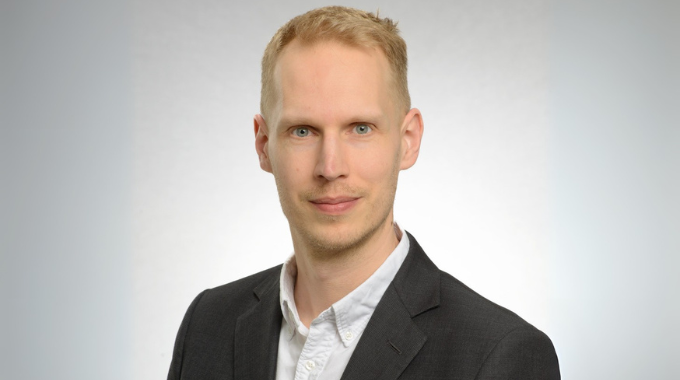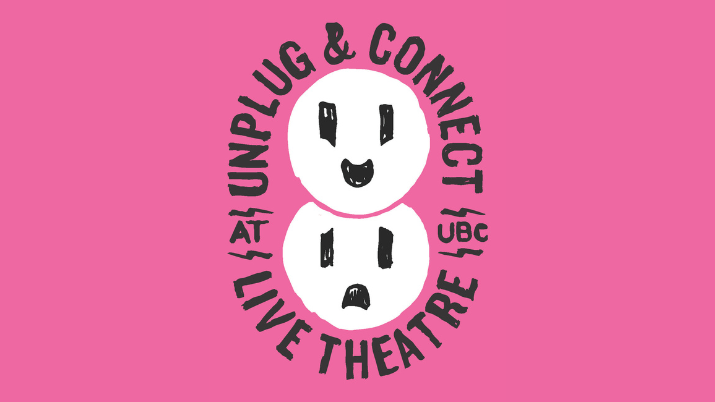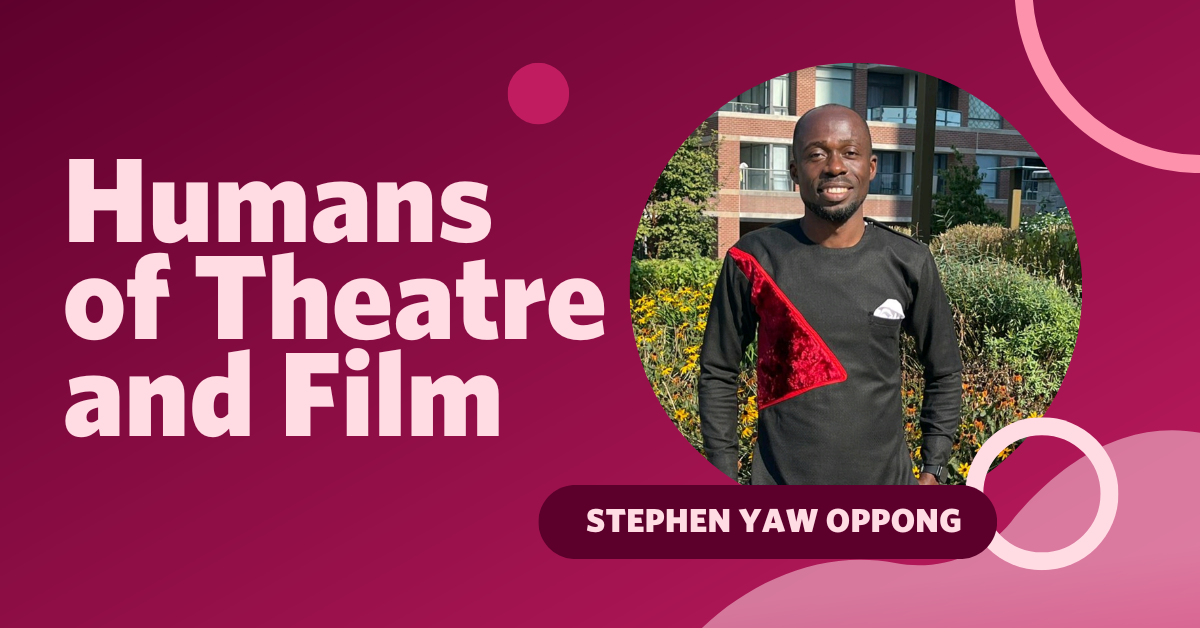

When many of us think of theatre and film, we envision showtime!, action!, and “to be or not to be!” While these fields are undeniably action-packed and creative, they encompass so much more. They’re about crafting and studying whole worlds. Theorizing and analyzing all those intricate moving parts that build experiences. Delighting audiences and inspiring them to reflect upon their own assumptions of what it means to be human.
The Department of Theatre and Film at UBC is home to a diverse group of passionate and talented faculty, staff, and students, who specialize in a wide range of theories, practices, genres, and methods. Next up in this series is Theatre Studies PhD student Stephen Yaw Oppong. Stephen shares about his childhood theatre journey in Ghana, the process of directing his first play in Canada, and his love for UBC’s AMS Nest.
What inspired you to study theatre?
Growing up, I performed in church plays and took part in a multi-talent group for children called GLOPAC, in Dormaa Ahenkro, Ghana. Unfortunately, by the time I was in junior secondary school, the group had died out and around the same time, in a very unfortunate circumstance for a child of my age, I dropped out of school a year and a half. During this period, I made the local community centre my school, watching mid-morning and afternoon film screenings. After, I would adapt the stories of the films I had watched into short dramas. This is how I developed my interest in playwriting. When I finally completed junior secondary school and started high school, I continued to develop my interest in drama—part of my love of literature. After high school, I joined the Redemption Drama Group. This group was involved in performances at marriage ceremonies and public functions, such as a municipal celebration of Ghana’s independence. Along the way, the group decided to include film in our work. I left the group to further my education at university, doing a BA in Theatre Arts (2014), and then a Master of Philosophy in Arts and Culture (2017). My interest in drama/theatre adaptation has roots in the film-to-drama adaptations I was making during my school drop-out period.
Tell us about your research focus
My research focuses on African receptions of ancient Greek theatre. From the early days in African independence from Western colonization in the early 1960s, African playwrights, working to create their own theatre, often used Ancient Greek theatre as a model for an African dramaturgy. This led to a proliferation of plays that are African adaptations of Greek theatre, staged both in Africa and abroad, becoming a kind of tradition in African theatre. My research studies the state of this tradition in the early 21st century—the current trends and the causes, drawing comparisons with the earliest plays in the tradition, and exploring the role of these plays in the creation of an African theatrical identity.
Can you share your experience directing the recent production of King Musu by E. Kwasi Amponsah?
King Musu is one of the adaptations that I am looking at in my research. Written in 2011 by Ernest Kwasi Amponsah, King Musu is an adaptation of Sophocles’ Oedipus Rex, which was written in the second half of the 5th century BCE. My production was funded by a UBC Public Scholars Initiative (PSI) grant—a program that helps doctoral students engage with their research in ways that go beyond the traditional written dissertation—with additional support provided by the Department of Theatre and Film. The show ran at the Dorothy Somerset Studio, April 10 to 13, 2024. This production marked the first time the play has been staged outside of Ghana.
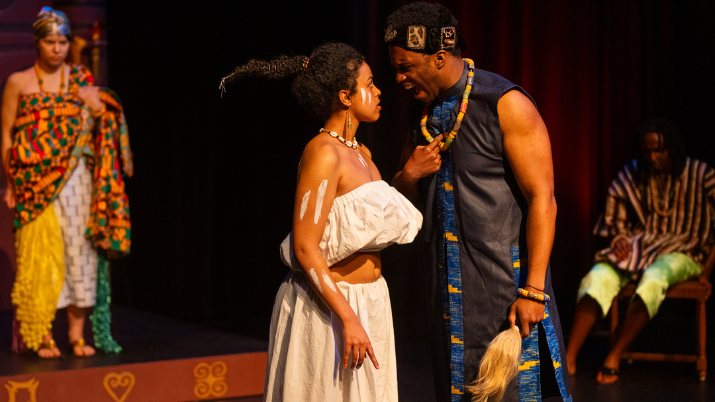

Production photo from King Musu by Javier Sotres
What were some of the challenges of the project?
The main challenge was the casting. The BFA Acting students were already committed to the plays in the Theatre at UBC season, so I did a general audition call, finding cast members from the larger UBC/Vancouver community. Although I decided to do colour-blind casting, it was difficult for non-Black people to even entertain the idea of performing in an African play, and I struggled to find performers for all the roles. I resorted to asking random people I met if they would be interested in participating in my project as performers! Since I was asking people to volunteer and the project required a lot of time for rehearsals and learning lines, it was hard to find actors to commit to it. Once I had a cast, I had to work around their existing commitments, such as classes and jobs, so we struggled to have all the cast available for rehearsals despite their unbelievable commitment. At the end of the day though, their amazing talents mitigated against the challenges to give us a wonderful production experience.
In addition, there was also a cultural gap that had to be addressed. Most of the designers and crew I worked with on the production were new to the Akan culture of the people of Ghana in which the play is set. Working together to answer the questions they had about the cultural context led to their wonderful creations, which were an essential part of the production.


King Musu production photo by Javier Sotres
What did you learn from the project?
Since this was the first time I directed a play in Canada, I acquired a lot of knowledge about producing and directing in the Canadian context.
What are your career aspirations after graduation?
Given my diverse range of abilities in the theatre, as both a researcher and a practitioner, I believe there are many opportunities out there waiting for me after graduation. However, I am not an office person—I am someone who always wants to meet with people, exchange ideas, and collaborate on projects. I, therefore, see myself in both academic and professional theatre arenas. After graduation, I primarily want to work as a theatre professor, while continuing to direct, focusing on African and Black theatre. As a playwright, I also plan to continue to write plays. If I return to Ghana, I have a lot to do in academia, since there is currently no theatre professor whose scholarship centres on the reception of ancient Greek theatre in Africa, which is what I am working on under the supervision of Professor Hallie Marshall.
Share your morning routine
As a Christian, I believe that I am only able to sail through the day safely by the grace of God. As such, despite the busy nature of this city and UBC, my daily routine begins with a period of prayer and the study of the Bible. Following that, I spend about half an hour exercising, take a bath and then breakfast. Then I launch myself into the day. At the end of the day, I once again take time to pray and give thanks to God for the day. To me, we have many things to give thanks for and this makes my day complete.
Where is your favourite place on campus?
My favorite place is the AMS Nest. As a theatre director and a playwright, one of the strongest tools I have is observation. The AMS Nest provides me with endless bodies in motion, diverse actions performed by a diversity of people. I think it is the largest place for cultural connections on the UBC campus daily, and this is unique to me as a lover of culture and performances.
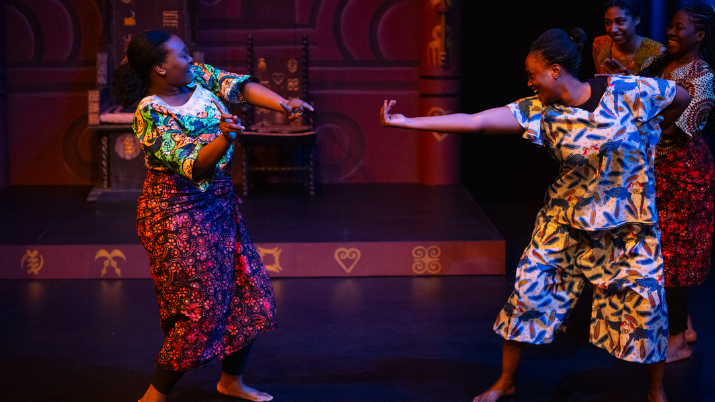

King Musu production photo by Javier Sotres
